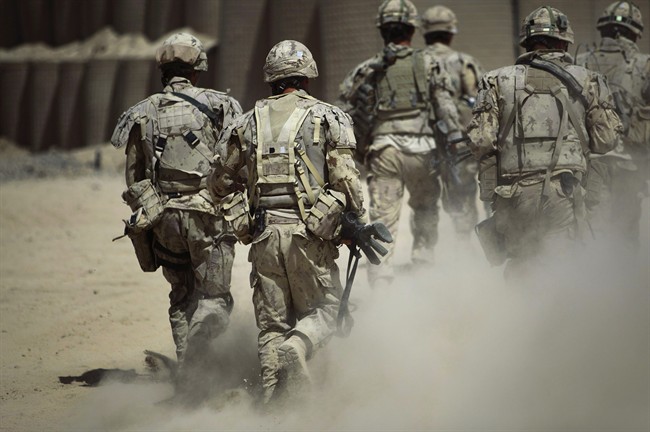OTTAWA – Post-traumatic stress is thought to have played a role in only three of ten suicides in the Canadian military last winter, and the majority of soldiers who took lives were not in danger of being kicked out.

The information is contained in a brief statistical summary obtained by The Canadian Press under access-to-information legislation.
Senior brass cobbled it together as they tried to wrap their heads around what was causing a spate of deaths between November 2013 and February 2014, and the data paints a counter-intuitive portrait of the crisis.
Public perception has been that the suicides were a direct result of the Afghan war, when in fact only five of the 10 had served in the war-torn country — and the majority of those for one tour.
SPECIAL SERIES: Global News spoke with five current and former members of the Canadian Forces, each with post-traumatic stress disorder. What they revealed amounts to a crisis in the military. READ THEIR STORIES HERE.
Military medical officials cautioned reading too much into the summary, saying little can be “concluded about suicide trends,” but the information is consistent with what investigators and health officials have uncovered.
Maj. Nicole Meszaros said it’s “incredibly difficult to predict who will take their lives.”
The figures show the bulk of the soldiers, although being under care for various conditions, were being retained in the military “without restriction” and no significant career changes were on the horizon.
Seventy per cent of them did not have a known history of suicide attempts.
READ MORE: ‘More than 200′ military members share stories of mental illness: DND
In terms of a social profile, seven of the 10 were divorced or separated. The majority came from the army and only a handful had any legal or disciplinary issues within the past two years.
“It is not unique to the (Canadian Armed Forces) or uncommon in Canadian society to have somebody externally appear and report to be doing well and responding well to treatment, tragically suddenly take their life,” Meszaros said in an email.
The military’s deputy surgeon general, Col. Colin MacKay, in a Feb. 21, 2014 email obtained under access to information, told the chief of military personnel, Maj.-Gen. David Millar, that the analysis represents a “shallow dive” into the issue and more study would be needed.
The suicide crisis last winter gripped the attention of the nation and prompted National Defence to begin filling long-vacant positions within the mental health branch, as well as to make several public appeals for troops suffering with mental illness to come forward.
The suicide analysis, along with figures released last week by Statistics Canada and comments last spring by the military’s top doctor, suggest the root causes of the tragedies may run deeper.
READ MORE: Fantino defends spending $4M more on veterans ads
The 2013 Health and Well-Being of Canadian Armed Forces Veterans found regular force veterans upon leaving the military rated their health more poorly than the general population.
It found their sense of community belonging was lower and they were “less often satisfied with life than most Canadians.”
The study said almost a quarter of those leaving the military reported both physical and mental disorders.
Testifying before the all-party House of Commons defence committee last spring, the military’s surgeon-general, Brig.-Gen. Jean-Robert Bernier, said that depression, especially among male Forces members, is double that of the civilian population.
It represents a “major concern,” he said.
Roughly 7.8 per cent of the military reported episodes of depression.
But that snapshot was taken prior to the Afghan war and Meszaros said Friday those numbers are being updated.
Medical professionals draw a direct link between instances of depression and suicide.
Understanding the extraordinarily high overall amount of depression is something the military is struggling is with, especially given that is a highly motivated profession.
“We haven’t been able to pin it down (to) specific exposures in military life,” said Bernier in an interview with The Canadian Press last spring, “although there are all kinds of increased risk factors for depression because of military service.”
There have been several internal studies over the last decade that have examined those risk factors and they have led to the development of the surgeon general’s mental health strategy, which is driving further research into the issue.


Comments